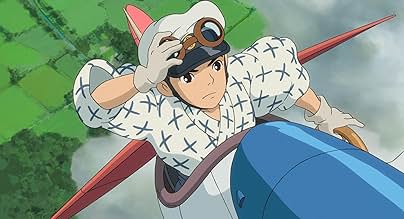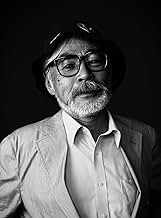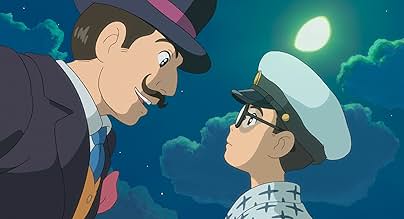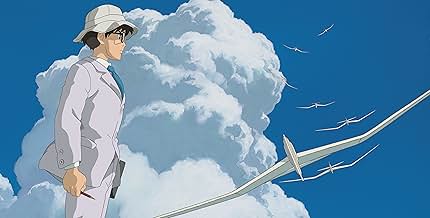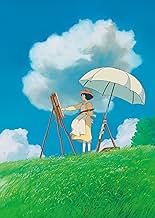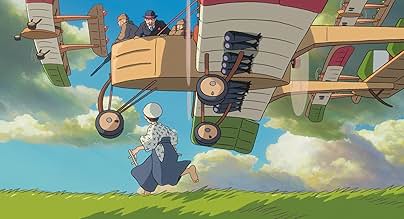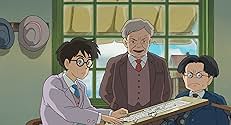A vida do designer de aviões Jiro Horikoshi e os principais acontecimentos históricos que afetaram sua trajetória.A vida do designer de aviões Jiro Horikoshi e os principais acontecimentos históricos que afetaram sua trajetória.A vida do designer de aviões Jiro Horikoshi e os principais acontecimentos históricos que afetaram sua trajetória.
- Indicado a 1 Oscar
- 26 vitórias e 54 indicações no total
Hideaki Anno
- Jirô Horikoshi
- (narração)
Hidetoshi Nishijima
- Honjô
- (narração)
Miori Takimoto
- Naoko Satomi
- (narração)
Masahiko Nishimura
- Kurokawa
- (narração)
Mansai Nomura
- Giovanni Battista Caproni
- (narração)
Jun Kunimura
- Hattori
- (narração)
Mirai Shida
- Kayo Horikoshi
- (narração)
Stephen Alpert
- Castorp
- (narração)
- (as Steve Alpert)
Shinobu Ôtake
- Kurokawa's Wife
- (narração)
Morio Kazama
- Satomi
- (narração)
Keiko Takeshita
- Jirô's Mother
- (narração)
Joseph Gordon-Levitt
- Jirô Horikoshi
- (English version)
- (narração)
John Krasinski
- Honjô
- (English version)
- (narração)
Emily Blunt
- Nahoko Satomi
- (English version)
- (narração)
Martin Short
- Kurokawa
- (English version)
- (narração)
Stanley Tucci
- Caproni
- (English version)
- (narração)
Mandy Patinkin
- Hattori
- (English version)
- (narração)
Mae Whitman
- Kayo Horikoshi
- (English version)
- (narração)
- …
Avaliações em destaque
I don't know if I loved it right from minute one, but then it doesn't quite start like any Miyazaki film (well, even with a dream scene). Its a little quieter, more natural, thoughtful and subdued, much like the main character will be through the film. And then earthquake hits. Its unlike anything you've seen in an animated film. It doesn't hype up its suspense or action. it simply shows Its protagonist, Jiro, react to a situation as calm and controlled as possible amid the debris and darkness and chaos, and help a couple of people in need. of course he doesn't know this young woman he saves will be an emotional foundation for his life. But as with any simple but splendid poetry we have a sense of the connection made.
Any other director might just make it a film about the 1920s earthquake that devastated Tokyo. Not Miyazaki. Soon after Tokyo is up and running and Jiro is after his passion which is airplanes. He dreams about them, and more than that dreams about the Italian icon of flying he looks up to as he gives Jiro advice and philosophical points about flying, inspiration and technology. And very soon after the film is more than anything about this man and his process - finding without any grandiose strokes what can make a plane fly quicker, faster, safer, with more agility and s look like no other. And, sometime soon, finding a love all his own.
Miyazaki has said (once again but probably for real this time) that he is done making films with the conclusion of the Wind Rises. If so, that's fine. I'm not sure if it's any sort of culmination of what his career has been or what he's said - Though you could certainly have a double feature with Porco Rosso, also about the wonder of flight but more in an adventure fantasy approach and have a fantastic several hours - and yet it's no less a marvel than anything else he's made. And if anything it just reveals more depths to how he feels for people and can show them in dimensions on screen than ever before. It is a biopic still, and a line here or there may be cornball, but so what. Its a fiercely intelligent film with genuine sentiment and a grace that comes from being a master letting your story unfold without rushing, letting scenes play out for full emotional weight, And ample colors and compositions painted with nostalgia for a mood (if not necessarily a side in history).
And yet you may think going in that there will be some sort of agenda politically speaking as it looks at a man who helped, ultimately, design planes that dropped bombs and shot and killed the US during world war two. It really isn't, or as simple as that. A couple of scenes with a German businessman of a sort voiced by Werner Herzog (yes the one and only, you'll know him when you hear him) lays out the futility in war and conflicts. And Jiro agrees. when someone speaks to him about what planes will be sent to fight whom, he is already resigned. "Japan will burn,' he says more or less. And yet he always stays more pragmatic, more about the work and the hard enough task to make the planes and make them fly high and well. This double edged sword also comes out when he is talking to his Italian guru in his dreams (especially the last one at the end of the war).
With all of this, the Wind Rises is a touching love story that seems possibly very doomed from the start - before getting engaged Jiro is told by Nahoko she has Tuberculosis and he doesn't care, or at least about that deterring him away - and how strong their bond is. How often do we get to see people in a movie, animated or otherwise, act like this to one another with kindness and compassion and a tenderness that (for the most part, maybe there's a bit of that "Japanese Disney" schmaltz but not much) is without any reservation? Not often really, at least like this as told at times without words at all; the high point of the picture is when there is a kind of wordless courtship as Jiro flies a paper plane around and it goes to the girl and she flies it back out as he chase to catch it and it repeats. The moving music, the amiable tone of the whole set piece, the mild peril... I'm at a loss to how much that just works because it feels true.
Did I mention its among the ten most beautifully animated films ever made? And I'm sure that group includes Mononoke and Totoro already. And I know full well a term like 'beautiful" is overused and tired. But Miyazaki crafts his works (or did) by hand with gorgeous, clear lines, water colors and maybe some cgi, and it both serves the story and its own sense of the world it's in: the earthy greens, the shiny clouds and blue skies, the metallic force of the planes, the drab grays of the offices and plane hangers. And yet you are still wrapped up in the tale of this man and those who cared about him or were inspired by and led by him, and is another rarity (easier to pull off in literature, trickier here and Miyzaki just about pulls it off): a mild wind that grows with power and energy, briefly, and then ebbs and flows with reality and, again, thought.
Any other director might just make it a film about the 1920s earthquake that devastated Tokyo. Not Miyazaki. Soon after Tokyo is up and running and Jiro is after his passion which is airplanes. He dreams about them, and more than that dreams about the Italian icon of flying he looks up to as he gives Jiro advice and philosophical points about flying, inspiration and technology. And very soon after the film is more than anything about this man and his process - finding without any grandiose strokes what can make a plane fly quicker, faster, safer, with more agility and s look like no other. And, sometime soon, finding a love all his own.
Miyazaki has said (once again but probably for real this time) that he is done making films with the conclusion of the Wind Rises. If so, that's fine. I'm not sure if it's any sort of culmination of what his career has been or what he's said - Though you could certainly have a double feature with Porco Rosso, also about the wonder of flight but more in an adventure fantasy approach and have a fantastic several hours - and yet it's no less a marvel than anything else he's made. And if anything it just reveals more depths to how he feels for people and can show them in dimensions on screen than ever before. It is a biopic still, and a line here or there may be cornball, but so what. Its a fiercely intelligent film with genuine sentiment and a grace that comes from being a master letting your story unfold without rushing, letting scenes play out for full emotional weight, And ample colors and compositions painted with nostalgia for a mood (if not necessarily a side in history).
And yet you may think going in that there will be some sort of agenda politically speaking as it looks at a man who helped, ultimately, design planes that dropped bombs and shot and killed the US during world war two. It really isn't, or as simple as that. A couple of scenes with a German businessman of a sort voiced by Werner Herzog (yes the one and only, you'll know him when you hear him) lays out the futility in war and conflicts. And Jiro agrees. when someone speaks to him about what planes will be sent to fight whom, he is already resigned. "Japan will burn,' he says more or less. And yet he always stays more pragmatic, more about the work and the hard enough task to make the planes and make them fly high and well. This double edged sword also comes out when he is talking to his Italian guru in his dreams (especially the last one at the end of the war).
With all of this, the Wind Rises is a touching love story that seems possibly very doomed from the start - before getting engaged Jiro is told by Nahoko she has Tuberculosis and he doesn't care, or at least about that deterring him away - and how strong their bond is. How often do we get to see people in a movie, animated or otherwise, act like this to one another with kindness and compassion and a tenderness that (for the most part, maybe there's a bit of that "Japanese Disney" schmaltz but not much) is without any reservation? Not often really, at least like this as told at times without words at all; the high point of the picture is when there is a kind of wordless courtship as Jiro flies a paper plane around and it goes to the girl and she flies it back out as he chase to catch it and it repeats. The moving music, the amiable tone of the whole set piece, the mild peril... I'm at a loss to how much that just works because it feels true.
Did I mention its among the ten most beautifully animated films ever made? And I'm sure that group includes Mononoke and Totoro already. And I know full well a term like 'beautiful" is overused and tired. But Miyazaki crafts his works (or did) by hand with gorgeous, clear lines, water colors and maybe some cgi, and it both serves the story and its own sense of the world it's in: the earthy greens, the shiny clouds and blue skies, the metallic force of the planes, the drab grays of the offices and plane hangers. And yet you are still wrapped up in the tale of this man and those who cared about him or were inspired by and led by him, and is another rarity (easier to pull off in literature, trickier here and Miyzaki just about pulls it off): a mild wind that grows with power and energy, briefly, and then ebbs and flows with reality and, again, thought.
This film is totally different from Miyazaki's other films and I personally think, like what he's mentioned, a message to to world about how he looks at the war, war machines , peace, love and living. As I am a Taiwanese, who has once colonized and ruled by Japanese during the second world war, how Japanese coped with the war topic is always sensitive. However, what I saw in this film is truly reflecting that Miyazaki is peace loving and his point of view on war, life and love. He depicted about the beauty of dreams and surviving. You can see that everyone in this film try every hard to live, even though the time is hard and forced to strike a balance between dreams and reality. However, they are self fulfilling. So who is to blame? who ruined their lives and dreams? Those who leads them to the war to blame.
In short, the film perfectly shows how the director's been telling in almost every his masterpiece but in a personally way, to the audience. Just like a final message he would like yo transmit to the world. I felt overwhelmed by the film and sad that he decided to retired. Please go to watch this film and you will do feel the courage to live hard and live well.
In short, the film perfectly shows how the director's been telling in almost every his masterpiece but in a personally way, to the audience. Just like a final message he would like yo transmit to the world. I felt overwhelmed by the film and sad that he decided to retired. Please go to watch this film and you will do feel the courage to live hard and live well.
... maybe that's Miyazaki's secret, finally unveiled in his latest movie: "The Wind Rises".
You know, it's been three months since I discovered his work and I never had to experience any kind of disappointment. And although I got used to his unequaled capability to catch my eyes and my heart, some of his movies really hit a sensitive chord, like "Kiki" or "Ponyo" and perhaps the action-less moments of "Nausicaa".
But I can't really describe the effect "The Wind Rises" had on me. For one thing, I'm glad I'm discovering it late because it's the film that best captures Miyazaki's love for airplanes. His passion never went unnoticed; how could it be? Almost half of his movies involve airplanes, flying devices or stunts in the air, but there has always been an element of fantasy that distracted from the personal approach he had to flying, even in "Porco Rosso" which was the most explicit homage to the Italian contribution to aviation.
But "The Wind Rises" made me realize how fantasy is perhaps the sincerest medium to convey passionate matters, because -to put it simply- it's all about dreams and vision that wait for the right wind to carry them a little and give them that extra push they need for flying. "The wind has risen, one must try to live" is the excerpt from Paul Valéry's poem that novelist Hori Tatsuo used as an inspiration for a tragic romance, and who else than Miyazaki could explore such a story, he who had dedicated all his life to things in the air, from feelings to plain things (pun intended). One thing he had in common with Jiro Horikochi, the main protagonist.
The film deals with planes in a way that has never been touched by Miyazaki, it's not about flying but about the dreams of flying, their very blossoming in the fertile soil of a man's mind. In fact, the film is less devoted to planes than to the devotion of a boy, then a man, who designed the Imperial Army's most notorious aircraft. They were used in the war but the film has a point to make about war. Miyazaki believes in Jiro's humanism and expresses it through very riveting dreamy moments. Jiro is a dreamer, literally, and whenever he dreams, he meets his all-time idol, Italian Giovanni Caproni. Together they share their views about planes, their universal appeal and sadly their belligerent uses (or misuses).
But don't get it wrong, just because it's in the poetic vicinity of Miyazaki's usual works, the film is as realistic as any serious biography picture, although fictionalized with a romance adapted from the "Wind Has Risen" novel and many events that struck Japan from the Great Depression to Kanto's earthquake, and last but not least, the war. Jiro is portrayed as a witness of his time who must adapt to the evolution of society, a two-pace society with a feudal heritage yet trying to match the Meiji dream. The most emblematic image is the prototype being pulled by ox. This is Miyazaki's most personal film, it has Japan, it has humanism and well, it has planes.
And to give you an idea, this film is far more revealing about Jiro than "A Beautiful Mind" with John Nash. There was something so catching in Jiro's passion, in the way he kept focused on his job. I could even feel I was venturing into his mind as if Miyazaki met him in his dreams before making this film. I have no clues about planes but I do love a movie about passion, this is a film about a man who loves planes by a man who loves them. To judge a good biopic, I guess it all comes to the area of passion driving the maker. Having thick glasses, Giro could never fly but Caproni almost rhymes with epiphany, the Italian icon tells him that he can't even fly a plane, but there's just something far more exhilarating than creating. And Miyazaki wouldn't disagree.
The heart of the film is centered on the romance between Jiro and a gentle tuberculosis stricken girl, like Hori's wife who inspired the novel. And whenever they meet, the wind rises and make their encounter possible. Air is our universal heritage, in the film, it reunites people and give a proper meaning to their life. This air so fragile in "Nausicaa", this air that symbolizes peace in a world that prepares to war and about which the post-apocalyptic Nausicaa warned us. Miyazaki signs his best film. I enjoyed it so much it could have been twice longer, to the post-war period time.
But the film culminates with the tragic ending and doesn't show much of the war. It is anticlimactic to use a technical term, but I guess it's a fine ending because there wasn't much to add about Jiro once he designed the prototype, once the plane that started as a concept hidden behind a fish bone became a technological marvel. The film is dedicated to the engineer and to the poet. And the verse "The Wind Rises, one must try to live" is so beautiful it could work as an epitaph for Hayao Miyazaki, summing up his best contribution to animation: inviting us to dream, to pursue our dreams and to take them seriously like a poet, a bit like an engineer, always like a dreamer.
This is one of the greatest animated movies of recent times, and given how critical I was about "Frozen", I was shocked that it won the Oscar. From what I read, there was some controversy surrounding the peaceful nature of Jiro, a sugarcoating of the war and an overuse of smoking. I'd say "The Wind Rises" deserved better than being beaten by a film that tried to play the "socially relevant" card to death. But the masterpiece flies over "Frozen" like a zeppelin over a fish bone.
You know, it's been three months since I discovered his work and I never had to experience any kind of disappointment. And although I got used to his unequaled capability to catch my eyes and my heart, some of his movies really hit a sensitive chord, like "Kiki" or "Ponyo" and perhaps the action-less moments of "Nausicaa".
But I can't really describe the effect "The Wind Rises" had on me. For one thing, I'm glad I'm discovering it late because it's the film that best captures Miyazaki's love for airplanes. His passion never went unnoticed; how could it be? Almost half of his movies involve airplanes, flying devices or stunts in the air, but there has always been an element of fantasy that distracted from the personal approach he had to flying, even in "Porco Rosso" which was the most explicit homage to the Italian contribution to aviation.
But "The Wind Rises" made me realize how fantasy is perhaps the sincerest medium to convey passionate matters, because -to put it simply- it's all about dreams and vision that wait for the right wind to carry them a little and give them that extra push they need for flying. "The wind has risen, one must try to live" is the excerpt from Paul Valéry's poem that novelist Hori Tatsuo used as an inspiration for a tragic romance, and who else than Miyazaki could explore such a story, he who had dedicated all his life to things in the air, from feelings to plain things (pun intended). One thing he had in common with Jiro Horikochi, the main protagonist.
The film deals with planes in a way that has never been touched by Miyazaki, it's not about flying but about the dreams of flying, their very blossoming in the fertile soil of a man's mind. In fact, the film is less devoted to planes than to the devotion of a boy, then a man, who designed the Imperial Army's most notorious aircraft. They were used in the war but the film has a point to make about war. Miyazaki believes in Jiro's humanism and expresses it through very riveting dreamy moments. Jiro is a dreamer, literally, and whenever he dreams, he meets his all-time idol, Italian Giovanni Caproni. Together they share their views about planes, their universal appeal and sadly their belligerent uses (or misuses).
But don't get it wrong, just because it's in the poetic vicinity of Miyazaki's usual works, the film is as realistic as any serious biography picture, although fictionalized with a romance adapted from the "Wind Has Risen" novel and many events that struck Japan from the Great Depression to Kanto's earthquake, and last but not least, the war. Jiro is portrayed as a witness of his time who must adapt to the evolution of society, a two-pace society with a feudal heritage yet trying to match the Meiji dream. The most emblematic image is the prototype being pulled by ox. This is Miyazaki's most personal film, it has Japan, it has humanism and well, it has planes.
And to give you an idea, this film is far more revealing about Jiro than "A Beautiful Mind" with John Nash. There was something so catching in Jiro's passion, in the way he kept focused on his job. I could even feel I was venturing into his mind as if Miyazaki met him in his dreams before making this film. I have no clues about planes but I do love a movie about passion, this is a film about a man who loves planes by a man who loves them. To judge a good biopic, I guess it all comes to the area of passion driving the maker. Having thick glasses, Giro could never fly but Caproni almost rhymes with epiphany, the Italian icon tells him that he can't even fly a plane, but there's just something far more exhilarating than creating. And Miyazaki wouldn't disagree.
The heart of the film is centered on the romance between Jiro and a gentle tuberculosis stricken girl, like Hori's wife who inspired the novel. And whenever they meet, the wind rises and make their encounter possible. Air is our universal heritage, in the film, it reunites people and give a proper meaning to their life. This air so fragile in "Nausicaa", this air that symbolizes peace in a world that prepares to war and about which the post-apocalyptic Nausicaa warned us. Miyazaki signs his best film. I enjoyed it so much it could have been twice longer, to the post-war period time.
But the film culminates with the tragic ending and doesn't show much of the war. It is anticlimactic to use a technical term, but I guess it's a fine ending because there wasn't much to add about Jiro once he designed the prototype, once the plane that started as a concept hidden behind a fish bone became a technological marvel. The film is dedicated to the engineer and to the poet. And the verse "The Wind Rises, one must try to live" is so beautiful it could work as an epitaph for Hayao Miyazaki, summing up his best contribution to animation: inviting us to dream, to pursue our dreams and to take them seriously like a poet, a bit like an engineer, always like a dreamer.
This is one of the greatest animated movies of recent times, and given how critical I was about "Frozen", I was shocked that it won the Oscar. From what I read, there was some controversy surrounding the peaceful nature of Jiro, a sugarcoating of the war and an overuse of smoking. I'd say "The Wind Rises" deserved better than being beaten by a film that tried to play the "socially relevant" card to death. But the masterpiece flies over "Frozen" like a zeppelin over a fish bone.
The Wind Rises is a fictionalized biography / character study of Jiro Hirikoshi and his story of becoming an Aviation Engineer. This movie had a great impact on me after seeing it in the theatre and I thought about what I had seen for the one hour drive home afterwards. In terms of pacing and how the movie focuses on the main character I was reminded of David Lean movies in its maturity and emotional grit. There were also times when watching that I thought to myself I have never seen hand drawn animation this good ever and will probably never see animation this good ever again. The character designs are beautiful. The backgrounds and color pallete are beautiful. The animation is breathtaking. But the story is just as beautiful as the artwork. The movie is about one mans journey to make beautiful airplanes but is also equally tragic in later scenes of the movie in the evolving love story and especially the last scene in the movie.
This movie does not explain at any time through dialogue what the character is feeling but instead it shows you and the subtle and at times powerful emotions which are the glue of what holds his story together. Some people may wonder why Miyazaki took creative risks with the real life story of Jiro Hirikoshi. The real life Jiro never married to a woman with Tuberculosis. Did he really fantasize about building airplanes? Was he really followed by a Soviet Spy? I think the way the character fantasizes about airplanes even when not dreaming is an honest depiction of how creative people like Hayao Miyazaki think.
Along with Porco Rosso this is probably Hayao Miyazaki's most personal movie. If you study Hayao Miyazaki's movies and read about his career like I have it becomes obvious that this movie is as much about Jiro Hirikoshi as it is about Hayao Miyazaki.
I recommend anyone who has ever been creative to go see the Wind Rises.
Hayao Miyazaki's Most Beautiful film.
This movie does not explain at any time through dialogue what the character is feeling but instead it shows you and the subtle and at times powerful emotions which are the glue of what holds his story together. Some people may wonder why Miyazaki took creative risks with the real life story of Jiro Hirikoshi. The real life Jiro never married to a woman with Tuberculosis. Did he really fantasize about building airplanes? Was he really followed by a Soviet Spy? I think the way the character fantasizes about airplanes even when not dreaming is an honest depiction of how creative people like Hayao Miyazaki think.
Along with Porco Rosso this is probably Hayao Miyazaki's most personal movie. If you study Hayao Miyazaki's movies and read about his career like I have it becomes obvious that this movie is as much about Jiro Hirikoshi as it is about Hayao Miyazaki.
I recommend anyone who has ever been creative to go see the Wind Rises.
Hayao Miyazaki's Most Beautiful film.
Aviation has always been a key element of the Studio Ghibli films; from the flying broomstick in Kiki's Delivery Service to the airborne armies in Howl's Moving Castle. So for Hayao Miyazaki's reported swan-song to focus on the development of aeroplane design is no surprise. A fictionalised biopic of designer Jiro Horikoshi, The Wind Rises is a stunning achievement, an animated film that uses the medium to tell a compelling, highly emotional story that has appeal for children and adults alike. Horikoshi's designs were used during World War 2, and that detail may make The Wind Rises unpalatable to some. But Miyazaki's films have never focused on battle-lines, but on the personal stories involved, and The Wind Rises gains power from the balancing of the beauty of the designs against the knowledge that the purpose for which the designs will be used leads to death and unhappiness. It's a bitter-sweet paradox, and one that many directors would sweep under the carpet. Instead, Miyazaki puts Horikoshi's dilemma centre-stage, and depicts the designer's angst as he finds himself immersed in industrial and international intrigue while he attempts to keep his own thinking pure. A subplot, invented for the film, relates how Horikoshi's work life is informed by his chaste romance with Naoko, a woman with tuberculosis who won't marry until she recovers. Horikoshi's dreams take flight while his day-to-day reality struggles to leave the ground behind. The Wind Rises stirs up sensational aerial dream sequences, but also captures the bleakness of life on the ground, as Tokyo recovers from a devastating earthquake. Horikoshi and Naoko journey to the Magic Mountain resort in an effort to address her physical malaise, and their interaction with a mysterious German spy, beautifully voiced by Werner Herzog, sketches out the sinister world of warmongering that forms the backdrop to their romance. Studio Ghibli films have always been beautiful to watch, and The Wind Rises excels in every frame. But the overriding message, about the role of a gifted individual to overcome the constraints of society, is just as beautifully wrought; The Wind Rises is required viewing for anyone who wants to have their spirits lifted and soar like the wind for two blissful hours.
Você sabia?
- CuriosidadesHuman voices are largely used as sound effects, such as engine roars and earthquake sounds.
- Erros de gravaçãoAfter Jiro tells Nahoko that he's finished designing his plane, he falls asleep. Nahoko removes his glasses and places them on the floor behind their heads. In the next shot, from behind their heads, there are no glasses on the floor.
- Cenas durante ou pós-créditos[A quote in French from a poem by Paul Valéry that appears as a caption at the start of the movie.] The wind is rising! We must try to live!
- ConexõesEdited into Miyazaki Dreams of Flying (2017)
- Trilhas sonorasHikouki-gumo
(Contrails)
Written by Yumi Matsutôya (as Arai Yumi)
Performed by Yumi Matsutôya (as Arai Yumi)
Courtesy of Toshiba EMI (Universal Music Japan)
Principais escolhas
Faça login para avaliar e ver a lista de recomendações personalizadas
Detalhes
- Data de lançamento
- País de origem
- Centrais de atendimento oficiais
- Idiomas
- Também conhecido como
- Se levanta el viento
- Empresas de produção
- Consulte mais créditos da empresa na IMDbPro
Bilheteria
- Orçamento
- US$ 30.000.000 (estimativa)
- Faturamento bruto nos EUA e Canadá
- US$ 5.209.580
- Fim de semana de estreia nos EUA e Canadá
- US$ 313.751
- 23 de fev. de 2014
- Faturamento bruto mundial
- US$ 137.090.189
- Tempo de duração
- 2 h 6 min(126 min)
- Cor
Contribua para esta página
Sugerir uma alteração ou adicionar conteúdo ausente







